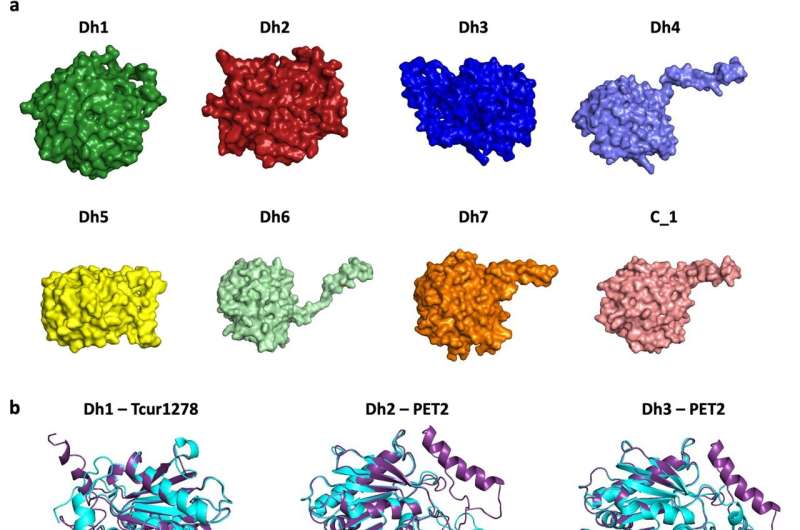This article has been reviewed according to Science X's editorial process and policies. Editors have highlighted the following attributes while ensuring the content's credibility:
fact-checked
peer-reviewed publication
trusted source
proofread
Plastic-eating enzymes could help solve pollution problem

Two new enzymes can break down one of the most common single-use plastics, according to the study "Modulating biofilm can potentiate activity of novel plastic-degrading enzymes" by Brunel University London published in the journal npj Biofilms and Microbiomes.
The enzymes could be developed to dissolve plastic bottles faster than current recycling methods and create the raw material to make new ones.
Water-polluting plastic waste is a huge problem, with most everyday single-use plastics destined for landfills, where they take hundreds of years to decompose.
Bacteria shows potential to help tackle the waste crisis, with scientists pinpointing several new species that encode enzymes that can degrade plastic. But these enzymes degrade plastic too slowly to be useful.
"These new findings are really exciting," said Dr. Ronan McCarthy. "Not only have we identified two new PET (Polyethylene terephthalate) degrading enzymes, but we found a way to improve their degradation abilities by modifying the bacteria as whole, rather than modifying each enzyme individually."
Biomedical scientists at Brunel are doing extensive research in synthetic biology to find ways to make these useful plastic degrading enzymes work harder.
Synthetic biology uses ideas from engineering to design new biological pathways, organisms and devices and to modify ones found in nature. In this new study, the researchers use the techniques to boost bacteria's abilities to grow in communities called biofilms.
Like people, bacteria don't often like living on their own. Bacteria living together in biofilm communities can share nutrients and communication signals and better withstand extreme temperatures and chemical hazards.
The team genetically engineered plastic-degrading bacteria to attach to waste plastic and form biofilms on it. This ramped up the concentration of the enzyme around the plastic, making it much more powerful and better at breaking it down. "This suggests that modulating biofilm formation may be an effective strategy to increase the efficiency of plastic degrading bacteria," said Dr. McCarthy. "Using biofilms to enhance plastic-degrading enzyme activity could potentially be applied to all plastic-degrading enzymes currently in development."
Biofilms form on many natural surfaces, such as soil, water and rocks. In health settings, bacterial infections such as MRSA can form biofilms that create a barrier to antibiotics and the immune system.
The team now plan to test the two new enzymes in a bioreactor. "We want to see if increasing biofilm formation improves the degradation of plastic in a more industrial-like setting," added researcher Dr. Sophie Howard. "We also aim to further harness synthetic biology to give even greater control over biofilm formation."
More information: Sophie A. Howard et al, Modulating biofilm can potentiate activity of novel plastic-degrading enzymes, npj Biofilms and Microbiomes (2023). DOI: 10.1038/s41522-023-00440-1
Journal information: npj Biofilms and Microbiomes
Provided by Brunel University





















